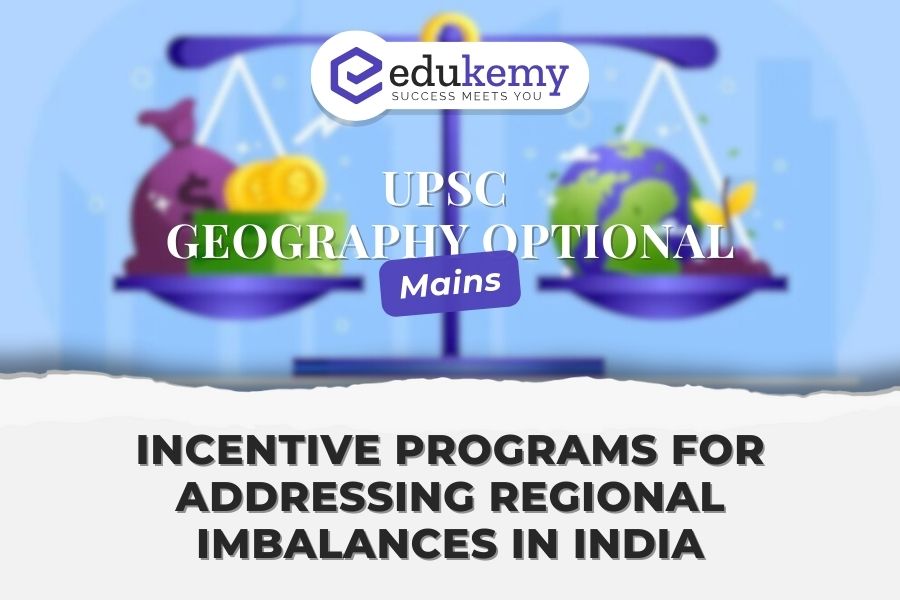
Explore incentive-oriented programs aimed at addressing regional disparities in India’s socio-economic development. Delve into the rationale and effectiveness of policies designed to incentivize investment, infrastructure development, and job creation in underdeveloped regions. Analyze the impact of fiscal incentives, subsidies, and special economic zones in fostering industrial growth and employment opportunities in disadvantaged areas. Understand the challenges and limitations of incentive-based approaches, including concerns about equitable distribution and long-term sustainability. Gain insights into the role of targeted interventions and policy coordination in promoting balanced regional development and reducing socio-economic disparities across India. Embark on a comprehensive analysis of the strategies employed to remove regional imbalances and foster inclusive growth in the nation’s diverse socio-economic landscape.
Contents
Answer:
Introduction:
Incentive-oriented programs are strategic frameworks proposed or implemented by governments or organizations, aiming to stimulate desired behaviors or activities within specific populations or regions.
Body:
India, a mosaic of diverse cultures, terrains, and economic capacities across its states and territories, has been proactive in deploying numerous incentive-oriented programs to mitigate regional imbalances. Here’s an analysis of several such initiatives:
- Pradhan Mantri Gram Sadak Yojana (PMGSY): This program aims at providing good all-weather road connectivity to unconnected villages. It facilitates socio-economic development in rural areas, thereby reducing regional disparities by connecting them with the markets, hospitals, and schools.
- National Rural Livelihood Mission (NRLM): Focused on promoting self-employment and organization of rural poor, this scheme aims to increase household income through sustainable livelihood enhancements and improved access to financial services.
- Make in India: Although a nationwide initiative, its strategic focus on 25 sectors of the economy with specific incentives for manufacturing units, tries to attract investments into areas that lag behind, thus leveling the industrial developmental field across regions.
- Smart Cities Mission: By focusing on developing sustainable and citizen-friendly cities, this program encourages regional development. Offering incentives for developing smart solutions for urban living, it indirectly benefits the surrounding underdeveloped areas through upgraded infrastructure and new job opportunities.
- Pradhan Mantri Kisan Samman Nidhi (PM-KISAN): This scheme directly supports the farming community by providing income support. While not area-specific, its uniform support mechanism helps lessen rural poverty, which is a significant issue in economically backward regions.
- Startup India: Encouraging entrepreneurship across the country, this initiative offers various benefits such as tax exemptions, funding opportunities, and easier compliance, aiming to foster a culture of innovation that can lead to job creation and economic vibrancy in lesser-developed regions.
- National Solar Mission: Part of the National Action Plan on Climate Change, this initiative aims to promote sustainable energy. It offers incentives for solar power production, benefiting sunny yet underdeveloped regions, thereby contributing to their economic development.
- Digital India: By aiming to transform India into a digitally empowered society, this initiative encourages the provision of government services electronically. It reduces regional disparities by ensuring access to information, services, and opportunities irrespective of the geographical location.
Conclusion:
Incentive-oriented programs play a crucial role in addressing regional imbalances by attracting investment, promoting industrialization, improving infrastructure, and fostering skill development in underdeveloped regions. To ensure sustainable development, it’s essential to continue implementing and refining these programs while also focusing on monitoring and evaluation to assess their effectiveness and make necessary adjustments for future success.
In case you still have your doubts, contact us on 9811333901.
For UPSC Prelims Resources, Click here
For Daily Updates and Study Material:
Join our Telegram Channel – Edukemy for IAS
- 1. Learn through Videos – here
- 2. Be Exam Ready by Practicing Daily MCQs – here
- 3. Daily Newsletter – Get all your Current Affairs Covered – here
- 4. Mains Answer Writing Practice – here

